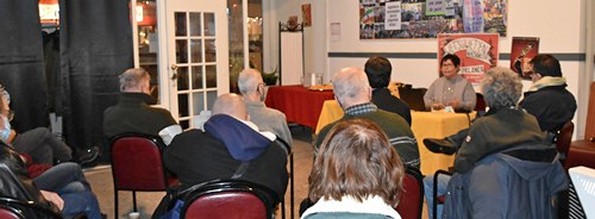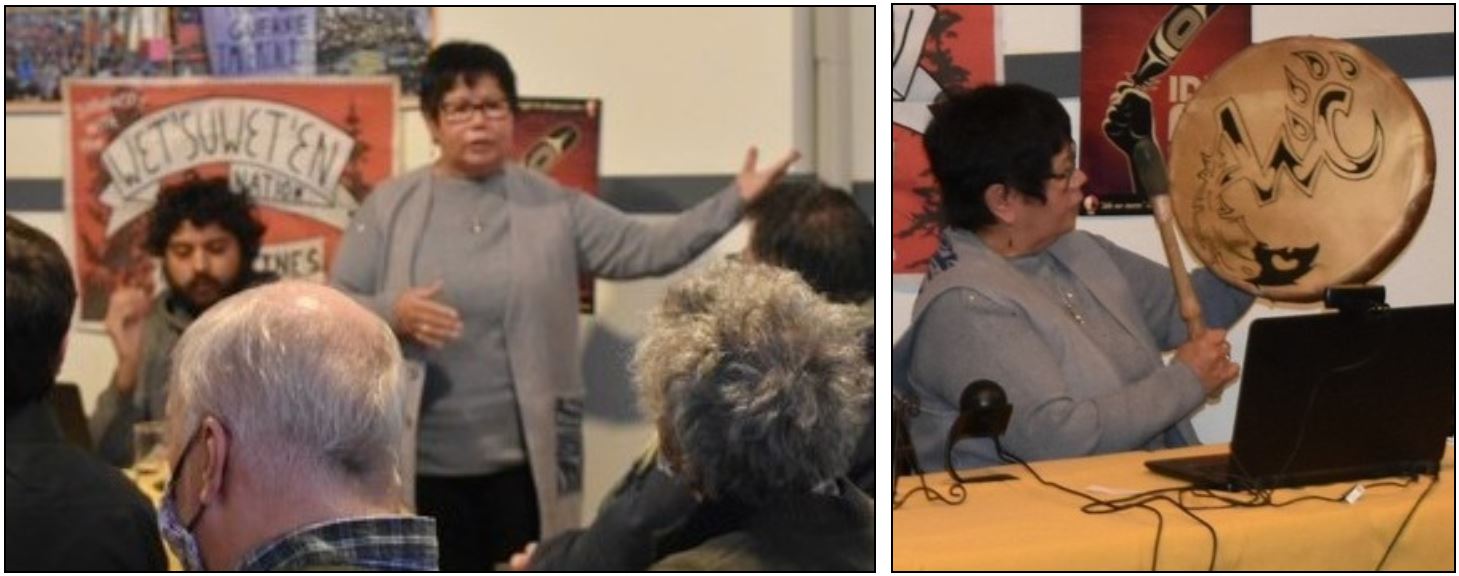All Out Support for the Wet’suwet’en and Those Fighting Against Climate Change!
A Conversation with Marlene Hale
– Diane Johnston –
A conversation took place on the evening of December 10 with Marlene Hale, an activist and elder from the Likhsilyu clan of the Wet’suwet’en Nation. The meeting was held in Montreal with participants on site as well as taking part virtually. Youth fighting for universities to divest from fossil fuel companies, environmentalists, the leaders of the Green Party and the Marxist-Leninist Party in Quebec, union representatives both active and retired, along with industrial and transportation, health care, social service and education workers were in attendance.

She began the conversation by evoking the struggle of her people against Coastal GasLink at the Gidimt’en Checkpoint camp on January 8, 2019, when around 130 RCMP officers were deployed to arrest 14 people.
Marlene is also involved in the struggle to conserve the Old Growth Forest at Fairy Creek on Vancouver Island, where Native elders and activists, including seniors and youth on the front lines, have been fighting to prevent the forest from being logged by the Teal-Jones Group. They also face regular RCMP incursions and brutality targeting the youth.
She began her presentation by turning to the most recent events that have taken place on her nation’s territory, where helicopters, dogs and snipers with guns pointed at us with “their finger on the trigger” were used to remove land and water defenders. “Where we stand today is no different than on January 8, 2019,” she said, adding that the situation they are facing has gotten even worse. “There is no respect with regard to the RCMP impeding on our territory.” She likened the situation facing the Wet’suwet’en to that of other Indigenous peoples across Canada, such as with 1492 Land Back Lane, as well as the struggle of Quebec’s First Nations.
“Nothing is peaceful when it comes to the RCMP and their powers,” Marlene said, recalling that the worst day of all was August 9, when the police violently assaulted activists blocking access to the old growth at Fairy Creek. The youth there had their masks removed by the RCMP, who sprayed pepper-spray directly into their eyes and mouths during one of the hottest days of the year, then confined many inside vehicles for hours without any access to water.
When it comes to the courts and to the government, she said, “there is nothing any more. The mainstream media has just turned a blind eye to everything presently taking place.” Referring to the RCMP she said: “They have again come into Wet’suwet’en territory.” Marlene also put the lie to media reports that it’s a provincial problem. “It’s not a provincial problem!” she stated. “We are Indigenous, we’re the First Peoples. This is our land.”
Participants Join the Discussion
One of the participants asked a question about the different tactics being used by activists in the two struggles. Marlene explained that both struggles are interrelated, giving the example of climate change. She pointed to the fact that recent landslides in BC are associated with clear-cutting, such as at Fairy Creek. She noted the irrationality of building a pipeline under the Morice River that provides drinking water for the Wet’suwet’en and supports the fish and animals and the land.
Another commented that what struck him was the clash of cultures, where on the one hand “you have the Wet’suwet’en saying ‘this is our sovereign land,’ and on the other the RCMP, trained in colonialism, saying: “Are you going to come out peacefully or do we have to get you out?”
For the RCMP, he noted, “upholding your culture and your right to be is violent. That is the culture of the oppressor.” In his view, he said, there can be no resolution of the problem “unless there are nation-to-nation relations, which include upholding your right, your culture, the way you define it.” He added that the colonialist mentality does not start with recognizing and upholding that this is your sovereign right. “So what we say about colonialism is not just an abstraction.” He stressed the importance of supporting the First Nations and their sovereign right to be, which includes their veto over activities carried out on their territories. “Only then,” he stressed, “can any resolution take place.”
Marlene likened the most recent invasion by the RCMP of Wet’suwet’en territory to that of going home and being greeted by a bunch of assault rifles. “You can’t go home. You can’t turn the key in your own door and you cannot walk in. It’s no longer your home. You have no right and you have no title. … We have this rifle and that speaks to both communities.” She then noted that no one in government “is saying no to that rifle and that’s where it’s got to stop.”
Another person commented that what has really become clear is the “real problem” we are confronted with. He recounted that last May, with the discovery of the unmarked graves holding the remains of thousands of Indigenous children, all the elected politicians expressed shock. He noted that at that time they were all “exclaiming that something had to be done and that there had to be reconciliation.” However, five months later, the RCMP attacked the Wet’suwet’en people. It made him wonder where all the politicians were now. “Back then they wanted the land. That’s why they worked out this plan to get rid of the kids and ‘take the Indian out of the child,'” he said. Their silence today, he continued, makes one think that the reason they’re not going to say anything is because if they get into power, they’re going to do the same thing, so they don’t want to be put on the spot. This is what we’re facing as Canadians with these politicians who are just completely bankrupt.”
Another person stressed that “there is a turning point in the consciousness of Canadians standing together with First Nations peoples, in standing for the rights of all. Having the consciousness about the laws of the Indigenous peoples, I think among young people, you see that.” Noting that the Canadian state is colonial and that the RCMP was formed to suppress the Indigenous peoples, he said he felt “the strength that is gathering of the movement itself of Indigenous peoples and the Canadian and Quebec peoples together, fighting for the rights of Indigenous peoples in the context of fighting for the rights of all.” With regard to the fight for Indigenous rights, he added that “we need to change the constitution of this country. It’s a colonial constitution and that work really belongs to the First Nations, the people of Quebec and the rest of us on Turtle Island.”
A McGill University student, active with Divest McGill, informed participants about the years-long struggle and ongoing fight being waged by students to get the university to stop investing McGill’s endowment fund in fossil fuels.
The meeting concluded with everyone feeling inspired by the courage and determination of the Wet’suwet’en and other First Nations in defending their rights and in protecting Mother Earth. They also recognize the growing consciousness of Canadians and Quebeckers with regard to the struggles of First Nations against colonialism and in defence of their right to be and see that fight as part and parcel of their own struggle in defence of the rights of all and of their right to determine their own destiny. They also recognize the necessity of broadening that struggle so that human beings finally occupy centre-stage. Together, it can be done!




